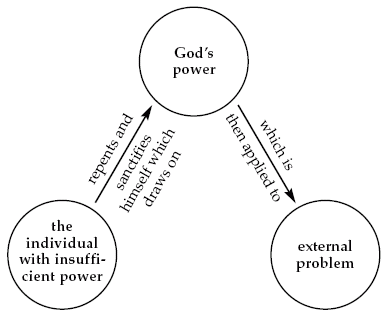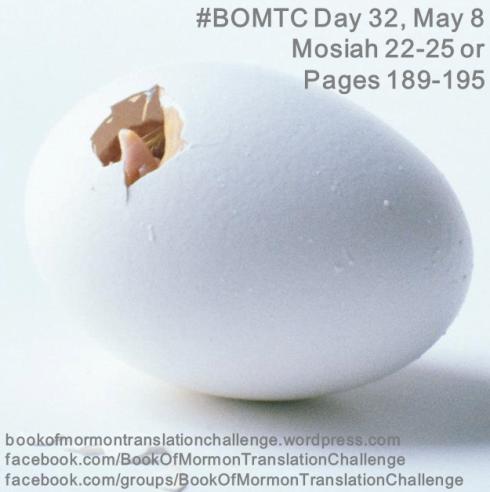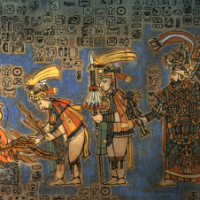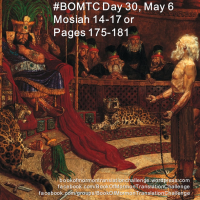“And now it came to pass that [their] burdens … were made light; yea, the Lord did strengthen them that they could bear up their burdens with ease, and they did submit cheerfully and with patience to all the will of the Lord.” —Mosiah 24:15

Limhi’s people came into Lamanite bondage as a result of their wickedness (see Mosiah 20:21) and were humbled and turned to God as a result of their bondage. By studying the trials and deliverance of Limhi’s group, we can see the Lord will answer our prayers in His own way and time as we humble ourselves (see Mosiah 22:1–9, 13–14). In contrast, Alma’s people were brought into bondage as a trial of their faith (see Mosiah 23:21). By studying the trials and deliverance of Alma’s people, we can learn how to rely on the Lord for strength amid our own struggles and challenges (see Mosiah 24:17–25). Both groups prayed mightily to be released from bondage. While both groups of people were eventually delivered and arrived in Zarahemla, the Lord helped each group in different ways. (See also Book of Mormon Study Guide for Home-Study Seminary Students, (2012), 131–33)

To be delivered usually means to be set free, helped, or brought through something. Studying these two accounts of divine deliverance can help us increase our faith to call upon the Lord for daily divine deliverance from whatever afflictions you are experiencing.
“No one wants adversity. Trials, disappointments, sadness, and heartache come to us from two basically different sources. Those who transgress the laws of God will always have those challenges. The other reason for adversity is to accomplish the Lord’s own purposes in our life that we may receive the refinement that comes from testing. It is vitally important for each of us to identify from which of these two sources come our trials and challenges, for the corrective action is very different” (Elder Richard G. Scott, “Trust in the Lord,” Ensign, Nov. 1995).
By comparing Limhi’s experience in Mosiah 21:16 with Alma’s experience in Mosiah 24:15 we can identify common ways that the Lord prepares His children for divine deliverance.
| LIMHI’S PEOPLE | ALMA’S PEOPLE |
|---|---|
| They were placed in bondage after much bloodshed (see Mosiah 21:5–13). | They were placed in bondage with no bloodshed (see Mosiah 23:35–38). |
| The Lord was slow to hear their cries because of their iniquities (see Mosiah 21:15). | The Lord answered their prayers quickly (see Mosiah 23:10–13). |
| Their burdens were eased because the Lord softened the hearts of the Lamanites (see Mosiah 21:15). | The Lord strengthened them so they could bear their burdens with ease (see Mosiah 24:14–15). |
| Gideon conceived a plan of escape (see Mosiah 21:36;22:1–9). | The Lord told them, “Be of good comfort, for on the morrow I will deliver you out of bondage” (Mosiah 24:16). |
| They got the guards drunk (see Mosiah 22:10). | The Lord caused the guards to sleep (see Mosiah 24:19). |
Instead of taking the time to read my thoughts on all of this, I feel it will be much more useful for you to use your time reviewing, “Trust in the Lord”, by Elder Scott.
Trust in the Lord
It is so hard when sincere prayer about something we desire very much is not answered the way we want. It is especially difficult when the Lord answers no to that which is worthy and would give us great joy and happiness. Whether it be overcoming illness or loneliness, recovery of a wayward child, coping with a handicap, or seeking continuing life for a dear one who is slipping away, it seems so reasonable and so consistent with our happiness to have a favorable answer. It is hard to understand why our exercise of deep and sincere faith from an obedient life does not bring the desired result.
No one wants adversity. Trials, disappointments, sadness, and heartache come to us from two basically different sources. Those who transgress the laws of God will always have those challenges. The other reason for adversity is to accomplish the Lord’s own purposes in our life that we may receive the refinement that comes from testing. It is vitally important for each of us to identify from which of these two sources come our trials and challenges, for the corrective action is very different.
If you are suffering the disheartening effects of transgression, please recognize that the only path to permanent relief from sadness is sincere repentance with a broken heart and a contrite spirit. Realize your full dependence upon the Lord and your need to align your life with His teachings. There is really no other way to get lasting healing and peace. Postponing humble repentance will delay or prevent your receiving relief. Admit to yourself your mistakes and seek help now. Your bishop is a friend with keys of authority to help you find peace of mind and contentment. The way will be opened for you to have strength to repent and be forgiven.
Now may I share some suggestions with you who face the second source of adversity, the testing that a wise Heavenly Father determines is needed even when you are living a worthy, righteous life and are obedient to His commandments.
Just when all seems to be going right, challenges often come in multiple doses applied simultaneously. When those trials are not consequences of your disobedience, they are evidence that the Lord feels you are prepared to grow more (see Prov. 3:11–12). He therefore gives you experiences that stimulate growth, understanding, and compassion which polish you for your everlasting benefit. To get you from where you are to where He wants you to be requires a lot of stretching, and that generally entails discomfort and pain.
When you face adversity, you can be led to ask many questions. Some serve a useful purpose; others do not. To ask, Why does this have to happen to me? Why do I have to suffer this, now? What have I done to cause this? will lead you into blind alleys. It really does no good to ask questions that reflect opposition to the will of God. Rather ask, What am I to do? What am I to learn from this experience? What am I to change? Whom am I to help? How can I remember my many blessings in times of trial? Willing sacrifice of deeply held personal desires in favor of the will of God is very hard to do. Yet, when you pray with real conviction, “Please let me know Thy will” and “May Thy will be done,” you are in the strongest position to receive the maximum help from your loving Father.
This life is an experience in profound trust—trust in Jesus Christ, trust in His teachings, trust in our capacity as led by the Holy Spirit to obey those teachings for happiness now and for a purposeful, supremely happy eternal existence. To trust means to obey willingly without knowing the end from the beginning (see Prov. 3:5–7). To produce fruit, your trust in the Lord must be more powerful and enduring than your confidence in your own personal feelings and experience.
To exercise faith is to trust that the Lord knows what He is doing with you and that He can accomplish it for your eternal good even though you cannot understand how He can possibly do it. We are like infants in our understanding of eternal matters and their impact on us here in mortality. Yet at times we act as if we knew it all. When you pass through trials for His purposes, as you trust Him, exercise faith in Him, He will help you. That support will generally come step by step, a portion at a time. While you are passing through each phase, the pain and difficulty that comes from being enlarged will continue. If all matters were immediately resolved at your first petition, you could not grow. Your Father in Heaven and His Beloved Son love you perfectly. They would not require you to experience a moment more of difficulty than is absolutely needed for your personal benefit or for that of those you love.
As in all things, the Master is our perfect example. Who could have asked with more perfect faith, greater obedience, or more complete understanding than did He when He asked His Father in Gethsemane: “O my Father, if it be possible, let this cup pass from me: nevertheless not as I will, but as thou wilt” (Matt. 26:39). Later He pled twice again: “O my Father, if this cup may not pass away from me, except I drink it, thy will be done” (Matt. 26:42; see also Matt. 26:44).
How grateful I am personally that our Savior taught we should conclude our most urgent, deeply felt prayers, when we ask for that which is of utmost importance to us, with “Thy will be done” (Matt. 26:42). Your willingness to accept the will of the Father will not change what in His wisdom He has chosen to do. However, it will certainly change the effect of those decisions on you personally. That evidence of the proper exercise of agency allows His decisions to produce far greater blessings in your life. I have found that because of our Father’s desire for us to grow, He may give us gentle, almost imperceptible promptings that, if we are willing to accept without complaint, He will enlarge to become a very clear indication of His will. This enlightenment comes because of our faith and our willingness to do what He asks even though we would desire something else.
Our Father in Heaven has invited you to express your needs, hopes, and desires unto Him. That should not be done in a spirit of negotiation, but rather as a willingness to obey His will no matter what direction that takes. His invitation, “Ask, and ye shall receive” (3 Ne. 27:29) does not assure that you will get what you want. It does guarantee that, if worthy, you will get what you need, as judged by a Father that loves you perfectly, who wants your eternal happiness even more than do you.
I testify that when the Lord closes one important door in your life, He shows His continuing love and compassion by opening many other compensating doors through your exercise of faith. He will place in your path packets of spiritual sunlight to brighten your way. They often come after the trial has been the greatest, as evidence of the compassion and love of an all-knowing Father. They point the way to greater happiness, more understanding, and strengthen your determination to accept and be obedient to His will.
It is a singularly marvelous blessing to have faith in the Savior and a testimony of His teachings. So few in the world have that brilliant light to guide them. The fulness of the restored gospel gives perspective, purpose, and understanding. It allows us to face what otherwise appear to be unjust, unfair, unreasonable challenges in life. Learn those helpful truths by pondering the Book of Mormon and other scriptures. Try to understand those teachings not only with your mind but also with your heart.
True enduring happiness with the accompanying strength, courage, and capacity to overcome the most challenging difficulties comes from a life centered in Jesus Christ. Obedience to His teachings provides a sure foundation upon which to build. That takes effort. There is no guarantee of overnight results, but there is absolute assurance that, in the Lord’s time, solutions will come, peace will prevail, and emptiness will be filled.
Recently a great leader, suffering from physical handicaps that come with advancing age, said, “I am glad I have what I have.” It is wisdom to open the windows of happiness by recognizing your abundant blessings.
Don’t let the workings of adversity totally absorb your life. Try to understand what you can. Act where you are able; then let the matter rest with the Lord for a period while you give to others in worthy ways before you take on appropriate concern again.
Please learn that as you wrestle with a challenge and feel sadness because of it, you can simultaneously have peace and rejoicing. Yes, pain, disappointment, frustration, and anguish can be temporary scenes played out on the stage of life. Behind them there can be a background of peace and the positive assurance that a loving Father will keep His promises. You can qualify for those promises by a determination to accept His will, by understanding the plan of happiness, by receiving all of the ordinances, and by keeping the covenants made to assure their fulfillment.
The Lord’s plan is to exalt you to live with Him and be greatly blessed. The rate at which you qualify is generally set by your capacity to mature, to grow, to love, and to give of yourself. He is preparing you to be a god. You cannot understand fully what that means, yet, He knows. As you trust Him, seek and follow His will, you will receive blessings that your finite mind cannot understand here on earth. Your Father in Heaven and His Holy Son know better than you what brings happiness. They have given you the plan of happiness. As you understand and follow it, happiness will be your blessing. As you willingly obey, receive, and honor the ordinances and covenants of that holy plan, you can have the greatest measure of satisfaction in this life. Yes, even times of overpowering happiness. You will prepare yourself for an eternity of glorious life with your loved ones who qualify for that kingdom.
I know the principles that we have discussed are true. They have been tested in the crucible of personal experience. To recognize the hand of the Lord in your life and to accept His will without complaint is a beginning. That decision does not immediately eliminate the struggles that will come for your growth. But I witness that it is the best way there is for you to find strength and understanding. It will free you from the dead ends of your own reasoning. It will allow your life to become a productive, meaningful experience, when otherwise you may not know how to go on (see D&C 24:8).
I testify that you have a Heavenly Father who loves you. I witness that the Savior gave His life for your happiness. I know Him. He understands your every need. I positively know that as you accept Their will without complaint, They will bless and sustain you. In the name of Jesus Christ, amen.
Please leave your thoughts about a special verse, teaching, etc. that you enjoyed at one of the following:
REPLY at the bottom of each post at: bookofmormontranslationchallenge.wordpress.com
LIKE our Facebook page and post at: facebook.com/BookOfMormonTranslationChallenge
JOIN our Facebook group and share at: facebook.com/groups/BookOfMormonTranslationChallenge
TWITTER and INSTAGRAM users can use #bomtc for related posts: twitter.com/brosimonsays | instagram.com/brosimonsays















